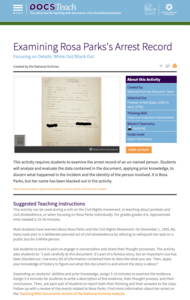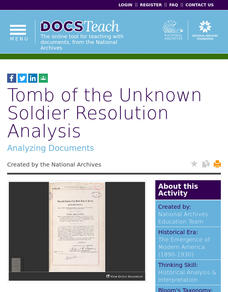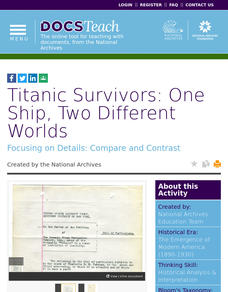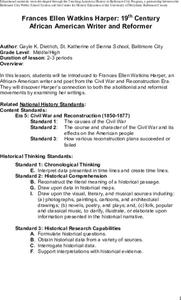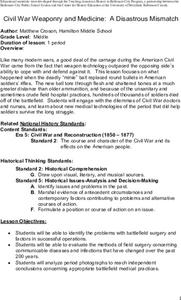Center for History Education
Did Southern Free Men of Color Fight for the Ideals of the South?
Much of history is distasteful. Primary sources often reveal attitudes acceptable at the time that no longer are. But to understand controversial historical events, historians must examine primary sources that represent a wide variety of...
Center for History Education
A Presidential Decision - The Bay of Pigs
The instructional activity examines President Kennedy's response to the Bay of Pigs Crisis and Cold War tensions. Academics learn how the information President Kennedy had affected his response to the question of whether to invade Cuba....
Center for History Education
Speaking Freely In the Soviet Union's Autocratic Government
Speak your mind! The lesson explores the difference in free speech between the United States and the Soviet Union. Academics review the constitutions of both governments, political cartoons, and case studies to understand how freedom of...
Center for History Education
Brown v. the Board of Education: Success or Failure?
Desegregation does not mean equality. An eye-opening lesson focuses on the impact of the Brown v. Board of Education decision to end school segregation. Scholars review a series of political cartoons to understand how the public viewed...
DocsTeach
Examining Where Rosa Parks Sat
When Rosa Parks took her seat on a public bus to protest segregation, she also took her place in history. Learners examine a clue from this story—a diagram of the bus—to see if they can figure out the pivotal role of this...
DocsTeach
Examining Rosa Parks's Arrest Record
There aren't a lot of details on the document, but Rosa Parks's arrest is now a legendary story of the civil rights movement. Class members examine the record—with Parks's names blotted out—to see if they can tell who this document...
DocsTeach
Containment in Korea: Entering the Korean War
An interesting resource explores President Truman's decision to enter into the Korean War to contain the spread of communism. Historians analyze the document using an online worksheet before participating in group discussion on the...
DocsTeach
WWI America: Babe Ruth's Draft Card
Even the Great Bambino wasn't above suspicion during World War I. An eye-opening activity explores America's greatest pastime through the lens of government officials during WWI. Academics examine Babe Ruth's draft card to understand how...
Center for History Education
The Federal Theatre Project: Analyzing Conflict Among Relief, Art, and Politics in 1930s America
In the effort to soothe the suffering of the Great Depression, New Deal programs funded a variety of approaches - including a theater project that proved controversial! Using documents such as oral histories, as well as photographs of...
Center for History Education
Maryland During the Secession Crisis
While many think the United States was neatly divided between Northern and Southern states during the Civil War, border states like Maryland are more complicated. Using hands-on activities to measure distance and primary sources,...
DocsTeach
Tomb of the Unknown Soldier Resolution Analysis
An eye-opening activity honors those soldiers that have fallen in battle but remain nameless. Scholars analyze the Unknown Solider Resolution created after World War I to honor those who died. Academics participate in group discussion to...
DocsTeach
Titanic Survivors: One Ship, Two Different Worlds
Scholars explore claims from two Titanic survivors, a first-class passenger and a person from the steerage class. The activity uses primary documents to help pupils determine whether the White Star Line showed preferential treatment to...
DocsTeach
The Zimmermann Telegram
An enlightening activity explains how a telegram prompted the United States to enter World War I. Scholars examine the telegram and work to decode it. To finish, individuals complete a worksheet and participate in group discussion to...
DocsTeach
The Titanic Disaster: Measuring Loss of Life, Property and Injuries
One man's unsinkable dream became a disaster for many. An intriguing activity uses primary sources to examine the claims made by Titanic survivors against the White Star Line. Scholars analyze the claims, complete a worksheet, and...
DocsTeach
The Titanic Disaster: One Survivor's Story
An activity focuses on Lucy Ridsdale, a survivor of the sinking of the Titanic. Scholars analyze primary sources and place them in the correct sequence. Academics also complete a worksheet and participate in group discussion to...
DocsTeach
Suffrage Photograph Analysis
Votes for women! Young scholars use images to explore the suffrage movement and its impact on the United States. Historians work in groups or pairs to interpret the photograph, complete a worksheet, and discuss how their opinions of the...
Center for History Education
Helping to Move On? An Analysis of the Reconstruction Amendments
Reconstruction amendments: a helping hand or another form of slavery? An inquisitive lesson plan compares the Reconstruction legislation that ended slavery, granted citizenship, and protected voting right for African American men....
Center for History Education
Frances Ellen Watkins Harper: 19th Century African-American Writer and Reformer
Although some African American abolitionists—such as Sojourner Truth and Frederick Douglass—are well known, others, like Frances Ellen Watkins Harper, remain in the shadows of history. Harper was a poet and activist who played an...
Center for History Education
Civil War Weaponry and Medicine: A Disastrous Mismatch
Ironically, science was the reason why the Civil War was so deadly. Despite the use of medical practices now considered barbaric—such as conducting surgery with bare, dirty hands—developments in weaponry meant that more men died on and...
Center for History Education
Northern Racism and the New York City Draft Riots of 1863
Just how racist were some people in the North during the American Civil War? Using excerpts of the Conscription Act, as well as graphic images of lynchings, young historians consider why white people in New York City rioted and killed...
Center for History Education
Lincoln and the Republicans: The Cause of the War?
In today's political rhetoric, many forget the pivotal role the Republican Party played in the causes of the Civil War. The party's formation was the final straw for Southerners who saw the enslavement of people of African descent a...
Center for History Education
Slavery and Civil Disobedience: Christiana Riot of 1851
When is it a moral obligation to disobey the law or to fight back? Using primary sources that document the "Christiana Riot" of 1851, learners consider these questions. The firsthand accounts tell the story of the riot, which happened...
ESRI
Juneteenth: An American History through Maps
An interactive website traces the history of Juneteenth celebrations from their origin in Galveston, Texas, on June 19th to the present day. Using interactive maps, learners can find information about the African-American population...
Center for History Education
Speaking Up and Speaking Out: Exploring the Lives of Black Women During the 19th Century
Young historians investigate the often-hidden history of free and enslaved African American women before the Civil War. Using a collection of primary and secondary sources, including speeches, diaries, and poems, they evaluate the often...







